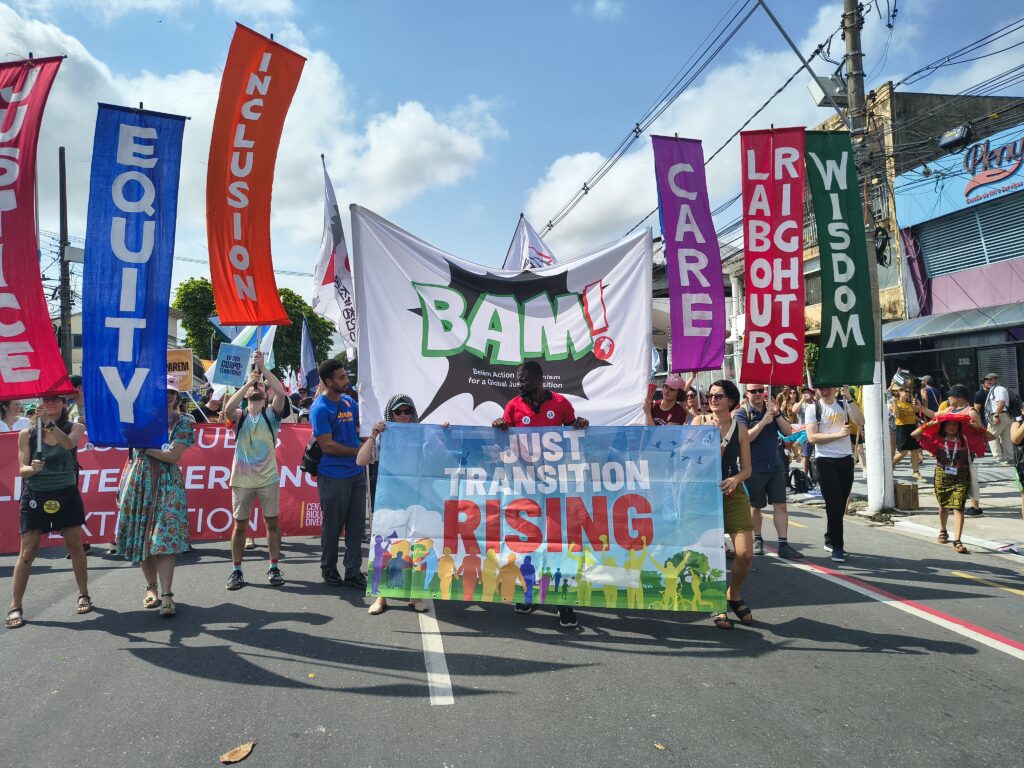COP30 closed exactly the way week one promised: with drama, sweat, and a tidal wave of contradictions. The negotiations burned through their final hours delivering a cover decision full of ambition but allergic to accountability, a finance text that reads like a poem about “trying,” and a desperate ministerial sprint to push weak language across the finish line before the rain flooded the venue again.
And then, through two weeks of procedural battles, sleepless drafting huddles, corridor protests, and a historic march in the streets, COP30 did something no COP before it has done: it created the Belém Action Mechanism (BAM).
A Mechanism Born From Movements
For the first time, Just Transition is treated as a structural transformation — not a job paragraph, not a moral side note, not a feel-good slogan. BAM is a political space to govern the economic, social, and environmental disruption of ending fossil dependency.
Let’s be clear: BAM is not a financing tool.
It doesn’t collect money. It doesn’t distribute funds. It doesn’t pretend to be a magic wallet where justice gets paid. BAM is something more subversive than cash: a mechanism to define, monitor, and demand accountability for justice across transitions — through indicators, mandates, and expectations that governments will be held against.
Meanwhile, the money story collapsed exactly as movements predicted. Finance was the battlefield and the burial site. Countries that spent months demanding legal obligations under Article 9.1 were pushed toward “collective efforts” and “voluntary pathways.” Article 9.5 transparency — the only tool that exposes who pays and who hides — was aggressively weakened. The NCQG was imagined as a number without a delivery plan, ambition without implementation, responsibility without commitment.
The Text Ends. The Struggle Continues.
Adaptation? Still a promise with no price tag.
Loss and Damage? A fund without contributors.
Fossil transition? Named, but without mandates or timelines.
And still — BAM stands. Not as charity, not as a gift from governments, but as an institutional win carved out by workers, Indigenous Peoples, feminists, youth, and frontline communities who fought for years to make Just Transition a negotiation, not a side event.
To the Workers Who Put Out the Literal Fire
Before we celebrate the political fire of BAM, a shout-out is owed to the people who put out the real fire — the workers of the venue who ran into smoke, shut down electrical systems, and calmly stopped panic while world leaders debated “risk management.” They didn’t negotiate safety. They delivered it. In a COP about transition, they were the transition — immediate, practical, and literally life-saving.
Their work is a reminder: a Just Transition can’t be negotiated if workers aren’t safe, respected, and centered. They carried what governments refuse to finance: protection.
The Fight Ahead
But here’s the warning: participation is not guaranteed.
Many governments would prefer BAM to remain behind closed doors, controlled by the same actors who resisted it. Civil society will have to fight to enter the room that movements built.
No finance means no transition.
No accountability means no ambition.
And no more polite applause for empty promises.
COP30 didn’t deliver the money. But it delivered the mechanism that will force that fight into the future. Justice is no longer an argument — it is now a mandate. And the next chapter will be about who gets to shape it, who gets to fund it, and who will be held to it.
The Amazon spoke. Movements spoke.
Now the BAM speaks — and it won’t be quiet.
*Cover photo by Climate Action Network


